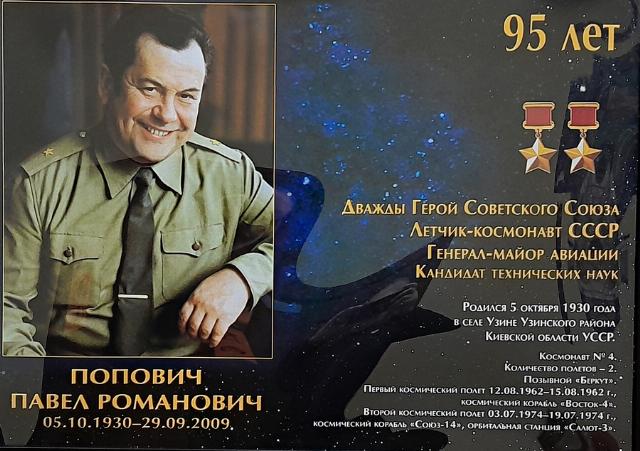October 5 this year marked the 95th anniversary of the birth of Soviet Cosmonaut Pilot No. 4, twice Hero of the Soviet Union, Aviation General Pavel Romanovich Popovich. On the eve of this date, on October 4, a gala evening was held in Zvezdny Gorodok, which was attended by the cosmonaut's daughters, his work colleagues, the leadership of the town, and local residents.
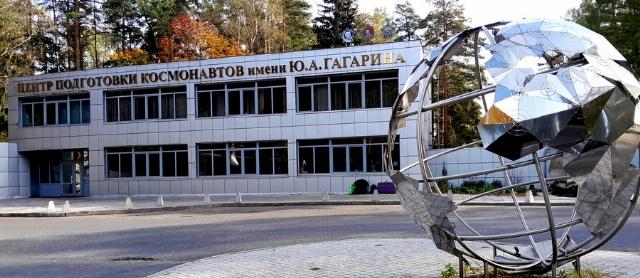 |
| Y.A. Gagarin CPC. |
| Source: Valery Ageev |
They showed particular interest in the historical and documentary philatelic exhibition "Flights of the Golden Eagle". According to its curator Dmitry Yaroshevsky, it included a selection of the first newspaper strips from 1962 dedicated to the flight of the Vostok-3 and Vostok-4 spacecraft, as well as a number of envelopes and postcards from the 60s and 70s with special stamps and authentic autographs by Pavel Popovich, Adrian Nikolaev and Yuri Artyukhin.
"It so happened that from the very beginning of the space age," Dmitry Vasilyevich explained, "the entire history of cosmonautics was certainly reflected in postal miniatures from around the world, most of which were released, as they say, "hot on the heels" of these epoch–making events.
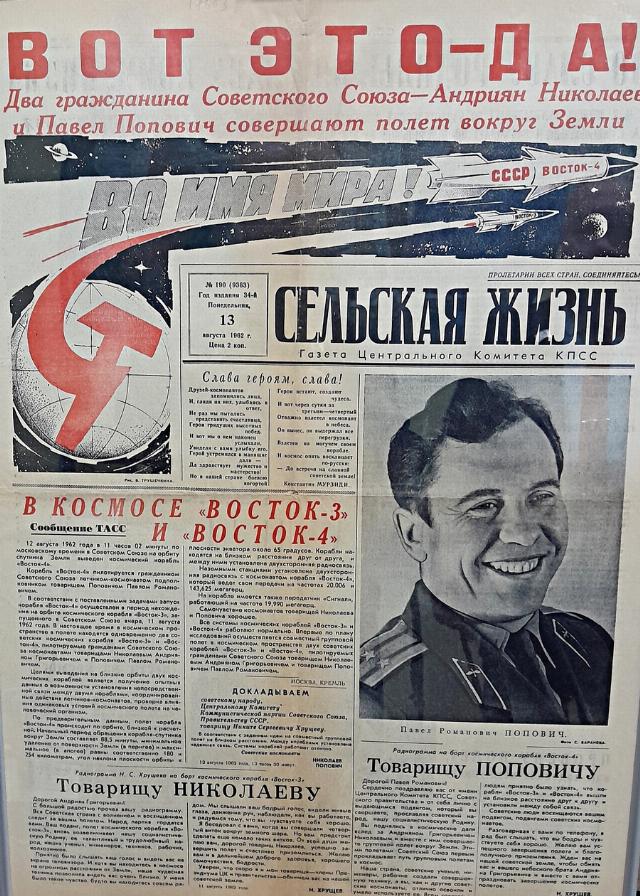 |
| Source: Valery Ageev |
Oksana Popovich hosted the evening.
Do you know what kind of guy he was?
The hero of our essay had an ordinary biography of an ordinary Soviet man. He was born in 1930 in the Ukrainian city of Uzin in the family of a stoker at a sugar factory and a housewife. In 1947, he graduated from seven classes and a vocational school in the city of Bila Tserkva. In 1951, he graduated from Magnitogorsk Aero Club (Chelyabinsk region). Since September 1952, he was a cadet at the 52nd Military Aviation School of Pilots in the Far East, but did not graduate from the school due to its disbandment. But, nevertheless, I did not forget the dream of heaven.
In 1954 he graduated from the Higher Officer Aviation Instructor School of the Air Force (Grozny). From December 1954 to March 1960, Pavel Popovich served in the Air Force combat units (in the Northern and Moscow Military Districts). In March 1960, he was enlisted in the Soviet Cosmonaut Corps (Air Force Group No. 1).
The world's first group flight
The flight on the Vostok-4 spacecraft, completed on August 12, 1962, was the world's first group flight of two manned spacecraft. Popovich (call sign "Berkut"), together with Andrian Nikolaev, solved the problems of approaching ships and installing radio communication between them, and took mutual photographs. During the flight, for the first time in history, astronauts "floated" in the cabin, making sudden movements and turns, while maintaining an unchanging connection with the Earth.
For the first time in the world, Popovich performed the orientation of a ship in space using a manual control system. For the first time, images of cosmonauts were broadcast on the USSR and Intervision television networks.
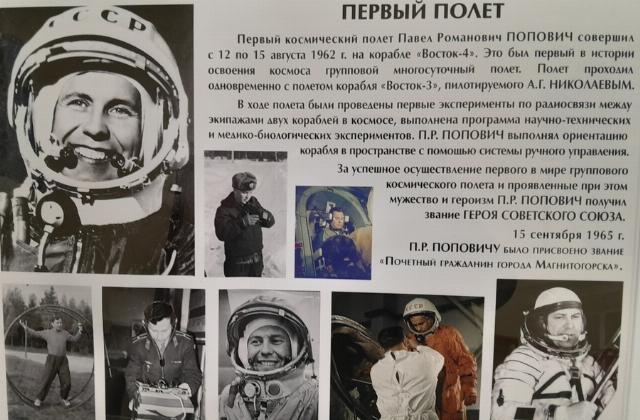 |
| Source: Valery Ageev |
As Popovich himself recalled, he, like any other person, felt a sense of fear.
- When you're sitting in a spaceship, and under you is a rocket almost 50 meters long, filled with 250 tons of liquid oxygen and kerosene, you can't help but think, he recalled.
"If he shies away, there won't be anything left of you." Vostoky did not have a SAS emergency rescue system. It was this SAS that saved Soviet cosmonauts Volodya Titov and Gena Strekalov at the launch. When the rocket exploded, 2 seconds before the explosion, the SAS took the ship to a height of 5 kilometers and 3 kilometers away.
As for fear, Popovich argued, anyone with a strong will can clamp down on any feeling. This quality is cultivated in everyday life.
For astronauts, weightlessness is the number one enemy, Pavel Romanovich argued. Even when the animals were launched, they noticed that after 4-5 hours of flight in zero gravity they behave inappropriately: they lose their appetite, do not drink water, and become passive. Cosmonaut No. 2 German Titov experienced the same feelings. On the third turn, Herman turned a little sour, to put it mildly. He tweeted, and then he answered all the questions with "yes" or "no", and then he said bluntly:
- It sucks!
Therefore, a lot of time was devoted to training the vestibular apparatus. Cosmonauts, according to Popovich's memoirs, twirled like ballerinas and acrobats. According to him, the scientists directly mocked them.
- Imagine, Pavel Romanovich recalled, they put you on a chair with one leg in the middle, tell you to close your eyes and pass an electric current! You just fall over. But man is a system that can be trained. He twitched a second time, but held on, and then you sit and at least whimper: the current is released, sparks are falling. Or you're balancing on the same chair, and a drum with dark and light stripes is spinning around you — horror! The members of the commission felt bad when they saw this.
Nikolayev was the first in the world to perform one "murderous" experiment in flight: he got off, got out of his chair and hovered in the ship for about an hour. Sergei Pavlovich Korolev was worried:
- You got rid of it, and if you can't get back? You don't care, because you're going to die, and I'm going to suffer!
Popovich also untied the seat belts, but he couldn't get out of the chair: the spacesuit was inflated.
"You push off," Nikolayev advised him. Pavel pushed off, but the weightlessness was the same as crashing his head into the ceiling. And then, for the first time in space, a real "Russian speech" sounded!
The secret Almaz program: space exploration
In June 1974, Popovich went on his second flight, which was the classified Almaz mission. For many years, the truth was hidden even from the family. Her real goal was the photographic reconnaissance of US military installations. There was even a special cannon on board, tested in space (now the exhibit is in the Tsiolkovsky State Museum of the History of Cosmonautics in Kaluga). The crew manually developed the films and sent the capsules with them to Earth. Thus, Popovich became the first cosmonaut of the Soviet Union to become a space scout.
- I saw American aircraft carriers with the naked eye, because the atmosphere works like a lens, Pavel Romanovich recalled.
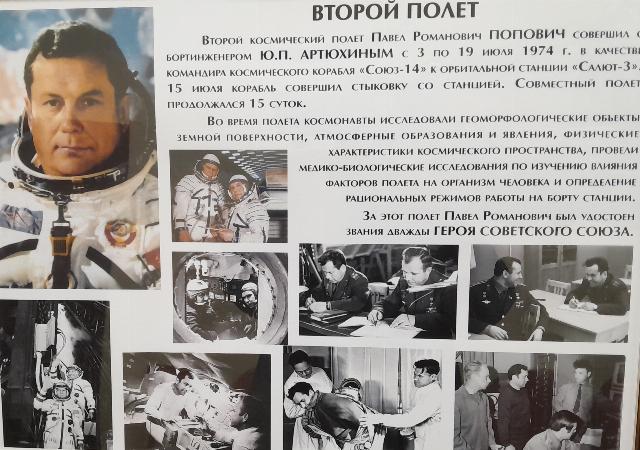 |
| Source: Valery Ageev |
How Popovich scared US President Nixon
During his space career as an astronaut, tragic and funny things happened to him. That's what he said:
— The “Lunar Group" was created. We, cosmonauts Leonov, Bykovsky, and I, along with the flight engineers, were preparing to fly around the moon. First, we launched special probes — our unmanned Soyuz spacecraft. We wanted to overtake the Americans. And now the last probe is coming.
I was asked to put a special jumper between the receiver and the transmitter. When I picked up the microphone and spoke from the command post in Yevpatoria, the receiver received the signal and transmitted it back to Earth through the transmitter. Three seconds later, they got my voice on Earth.
The Americans intercepted the signal, became alarmed, and reported to President Nixon that "Popovich is speaking from the moon!" After that, Nixon's space adviser, astronaut Frank Borman, called Popovich a "space" bully!
Family matters
In 1951, in Novosibirsk, at the flight school, Popovich met the pilot Marina Lavrentievna Vasilyeva. In 1955, they became husband and wife. They had two daughters, Natalia and Oksana. Marina Popovich became a 1st class test pilot, Honored Master of Sports of the USSR, 102-time world record holder.
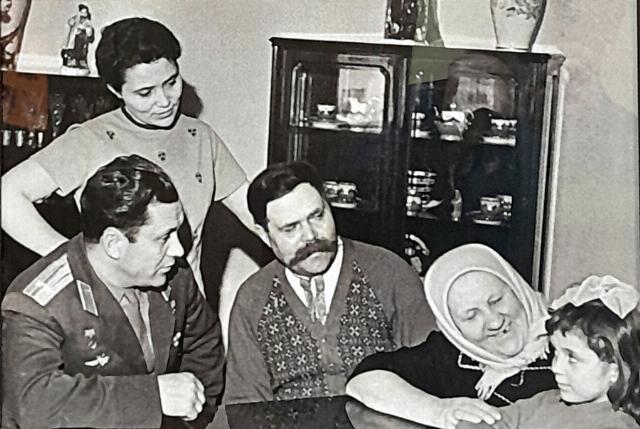 |
| Source: Valery Ageev |
She was the first female Soviet test pilot to break the sound barrier on a MiG-21 fighter jet, earning her the nickname "Madame MiG" in the foreign media. Her total flight time was about 6 thousand hours on 40 types of aircraft and helicopters.
She has written nine books independently and in collaboration, including collections of poetry, prose works, books about UFOs, etc.
The character of both Popovich spouses turned out to be difficult. By the nature of their work, each of them was required to be both stubborn and firm. Both of them were leaders. Living together ended in separation. However, the ex-spouses maintained friendly relations.
And life went on. Pavel Romanovich defended his PhD thesis in 1977. From 1982 to 1989, he served as Deputy head of the Yuri Gagarin Scientific Testing and Research Center. Since 1993, he has been a Major General of aviation in the reserve.
A comprehensively gifted man, Popovich wrote poetry and books, both autobiographical in nature and containing reflections on the future of technological progress and humanity. He did not live to see his 79th birthday for only 6 days - on September 30, 2009, he died of a stroke in Gurzuf. He was buried at the Troekurovsky Cemetery in Moscow.
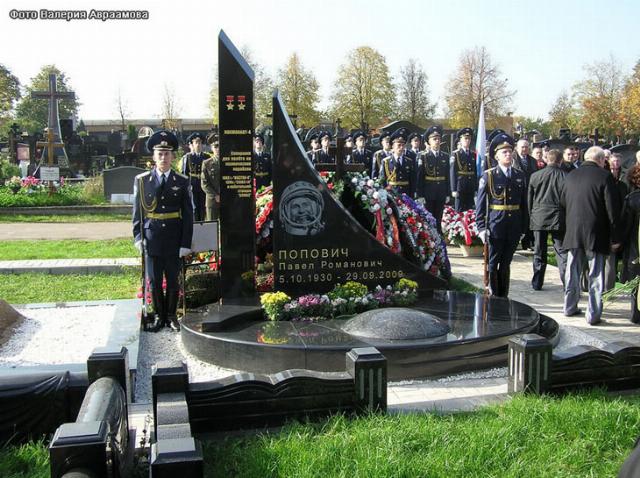 |
| Source: Valery Ageev |
Valery Ageev
